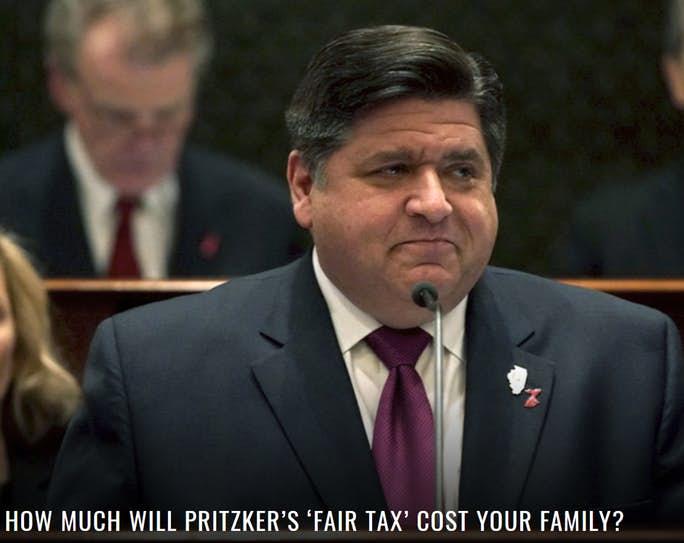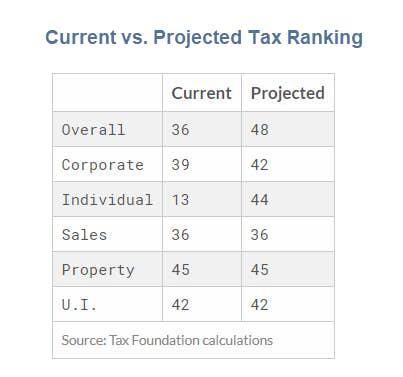Authored by Mike Shedlock via MishTalk,
The Illinois Gov. seeks a constitutional amendment to change the tax code. He calls it a “fair tax”. Don’t be fooled.
New Illinois J. B. Governor Pritzker (D) has proposed sweeping changes to Illinois’ tax code, advocating a constitutional amendment to permit a graduated-rate income tax and proposing a new rate and bracket structure.
Pritzker’s plan which he labels a “fair tax” will encourage still more flight out of Illinois.
Jared Walczak for the Tax Foundation explains Twelve Things to Know About the “Fair Tax for Illinois”
Here are some snips from a lengthy article.
Key Findings
-
Under the proposal, corporate income would be taxed at 10.45 percent, the third-highest rate in the nation, while pass-through business income would be taxed at a top rate of 9.45 percent, the fourth highest such rate nationwide.
-
The proposal diverges sharply from ideal—or even typical—income tax structure. It omits inflation indexing (resulting in “bracket creep”), creates a marriage penalty, and includes a recapture provision which subjects the entirety of a taxpayer’s income to the top marginal rate once they reach that bracket.
-
The neighboring states of Indiana, Iowa, Kentucky, and Missouri have all cut income taxes in recent years, while Illinois may be headed in the opposite direction.
-
The governor’s proposed tax rates are merely notional; should voters permit a graduated-rate income tax, there are compelling reasons to believe that rates may climb even higher, and that more taxpayers would be subjected to higher rates.
-
Were the proposal implemented, Illinois is projected to decline from 36th to 48th on the State Business Tax Climate Index, which measures tax structure.
Introduction
The new governor of Illinois, J.B. Pritzker (D), has one campaign behind him, but an even bigger one lies ahead: convincing the legislature—and Illinois voters—to scrap a key constitutional feature of Illinois’ system of taxation.
A provision in the state constitution which prohibits a graduated-rate income tax has long been a source of controversy. In a state where taxes tend to be high, it has also been crucial to keeping one tax (the individual income tax) highly competitive, because there are practical and political limits on just how high a rate can go when it is applied uniformly.
The constitutional amendment Gov. Pritzker is championing would change all that, and under the rates and brackets he has proposed, would give Illinois some of country’s highest income taxes (individual and corporate), particularly on businesses. That’s of particular concern in a state that has struggled to stem the tide of business departures, as the governor noted in remarks this week, but it’s only one of many issues raised by the proposal.
All told, the governor’s “Fair Tax for Illinois” proposal would result in a 10.45 percent combined rate on corporate income, and a 9.45 percent rate on about half the state’s pass-through income, including the “personal property replacement taxes” the state tacks onto rates.
Among the Highest Rates in the Country
When Illinois lawmakers repealed the state’s taxes on tangible personal property forty years ago, they paid for the repeal by creating a second set of taxes on both pass-through and corporate income, confusingly termed “personal property replacement taxes” (PPRTs). The name references the tax they replaced rather than the nature of the taxes themselves, which are nothing more than additional income tax levies of 2.5 percent on corporate income and 1.5 percent on the income of pass-through businesses, with revenue devoted to local government. The income of pass-through businesses (S Corps, partnerships, LLCs, and sole proprietorships) “passes through” to their owners’ individual income tax returns (hence the name). Including these taxes, the top rate on pass-through businesses would be 9.45 percent and the new rate on corporate income would be 10.45 percent.
This would represent the third-highest corporate rate in the country, after Iowa (12 percent) and New Jersey (11.5 percent), and Iowa is scheduled to reduce its top corporate rate to 9.8 percent in a few years. It also represents the fourth-highest rate on pass-through income nationwide, after California (13.3 percent), Oregon (9.9 percent), and Minnesota (9.85 percent). The 7.95 percent rate on non-business income would be the eighth-highest state rate in the country.
Neighboring States
Indiana has reduced its top corporate income tax rate from 8 to 5.75 percent and is on track to bring it down to 4.9 percent in a few years, while its individual income tax rate has gone from a flat 3.4 percent to 3.23 percent over five years. Policymakers in Indiana have consciously positioned themselves as a more competitive alternative to Illinois, and they aren’t alone.
In Missouri, a set of bills in 2018 reduced the top income tax rate from 5.9 to 5.5 percent, with a further phasedown to 5.1 percent in the works, while the corporate rate is set to fall from 6.5 to 4 percent in 2020.
Meanwhile in Iowa, a package of reforms adopted last year will ultimately bring the top individual income tax rate to 6.5 percent (from 8.98 percent) and the corporate rate to 9.8 percent (from 12 percent),
Kentucky just replaced its graduated-rate individual and corporate income taxes with single-rate taxes of 5 percent. Even in Minnesota, legislators are contemplating tax cuts to offset additional revenue from tax conformity.
In short, Illinois would be raisings its tax rates at a time when its neighbors are headed in the opposite direction.
Tax Cliff
Tax rates are typically marginal, which is to say that they are imposed on marginal income. For instance, under the governor’s proposal, the first $10,000 in taxable income would be taxed at a rate of 4.7 percent, and someone earning $11,000 would only pay the higher rate of 4.9 percent on the additional $1,000, not the whole $11,000. According to handouts outlining Gov. Pritzker’s proposal, however, “[o]nce income reaches $1.0 million, entire income is taxed at 7.95 [percent] rate” (emphasis in original).
This creates a significant tax cliff, where a person making $1,000,000 pays $70,935 in taxes, while someone earning one dollar more pays $79,500, a difference of $8,565 on a single dollar of income.
Marriage Penalty
A marriage penalty exists whenever two earners owe more tax filing jointly than they would if they filed separately. The penalty can emerge when any part of the tax code—brackets, deductions, or exemptions—do not increase for joint filers, but bracket widths under a graduated-rate income tax are particularly important. Many states double their bracket widths for married couples to avoid the penalty, but the Illinois proposal envisions the same brackets for single and joint filers.
Bracket Creep
Within a graduated rate structure, inflation can impose a hidden tax, increasing the taxpayer’s liability as a greater share of their income is taxed even if that income has not increased in real terms, since bracket kick-in thresholds are fixed. To avoid this “bracket creep,” most states with graduated-rate structures index bracket widths and other features of the income tax to inflation. Pritzker’s proposal gives no indication of this, meaning that over time, taxpayers will pay an increasing amount of taxes as a percentage of income—even if their income has not increased in real terms.
Decline in Illinois’ Business Competitiveness
Every year, the Tax Foundation publishes a new edition of the State Business Tax Climate Index, a measure of state tax structure. Illinois currently ranks 36th overall, with its competitive income tax balancing out poor tax structure elsewhere. If, however, the state were to adopt the graduated rate structure Pritzker proposes, with top rates of 9.45 percent on pass-through income and 10.45 percent on corporate income, while creating a marriage penalty and forgoing inflation indexing, the state’s overall rank would plummet from 36th to 48th, ahead of only California and New Jersey.
Current vs Projected Illinois Tax Ranking
States should care about their Index ranking because it is measuring something real and economically meaningful—the competitiveness, or lack thereof, of the state’s overall tax structure. Were Pritzker’s proposal adopted, Illinois would trail its peers in just about every aspect of its tax code. If businesses and individuals are leaving the state now, these policies can only make the problem worse.
End Jared Walczak – Mish Comments
Progressives in Illinois have all but ruined the state. Pritzker seems bound and determined to finish off the job.
With House leader Michael Madigan fully in charge of legislation, Pritzker is poised to do just that.
Dictator of Illinois
The Illinois Policy Institute notes that Madigan has already broken the record for longest-serving state legislative speaker in U.S. history. No American has led a state House of Representatives longer than Illinois House Speaker Mike Madigan. He has held the speakership for all but two years since 1983.
Democrats are responsible for this mess. No legislation passes without Madigan’s stamp of approval
Only One Thing in the Way
This proposal would easily succeed were it not for one simple fact. It requires a change in the Illinois constitution.
The constitution needs changing for sure but not in this direction.
Illinois desperately needs pension reform and bankruptcy reform. Instead, we have garbage proposals like this disguised under a “fair tax” label.
Constitutional Amendment
The Illinois Constitution can be amended either by Constitutional Convention (if 3/5 of the members in each House of the General Assembly agree to it, which voters can approve or disapprove) or by the General Assembly (if 3/5 of each house of the General Assembly approve the amendment, which is then submitted to the voters at the next general election).
The former won’t happen. It would open the door to genuine reform that Illinois needs.
Five Certainties
The amount the tax will cost each individual depends on personal finances. But here are five certainties.
-
The tax hike would depress job growth
-
The tax hike would raise taxes on the middle class
-
The tax hikes would encourage business flight
-
The tax hike would encourage flight of wealthy individuals
-
Since revenue projections won’t happen, Illinois progressives would seek still more tax hikes once the constitution allows for it.
Don’t Be Stupid
Here’s my message to Illinoisans: Don’t be stupid.
via ZeroHedge News https://ift.tt/2TEo5jS Tyler Durden

